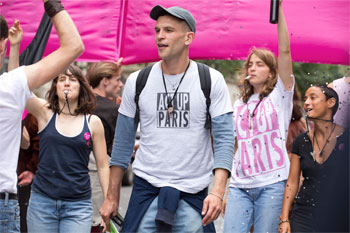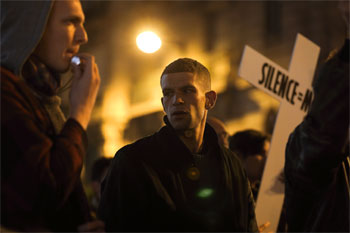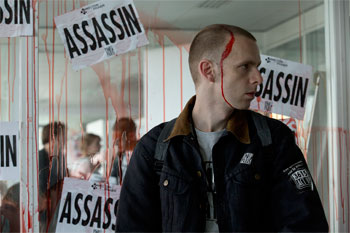Robin Campillo BPM Interview

120 Beats Per Minute
Cast: Nahuel Pérez Biscayart, Arnaud Valois, Adèle Haenel
Director: Robin Campillo
Genre: Drama
Running Time: 143 minutes
Synopsis: Early 1990s. With AIDS having already claimed countless lives for nearly ten years, Act Up-Paris activists multiply actions to fght general indifference. Nathan, a newcomer to the group, has his world shaken up by Sean, a radical militant.
BPM
Release Date: May 17th, 2018
Interview with Robin Campillo
Question: What did Act Up-Paris mean to you before you made this film?
Robin Campillo: I joined Act Up in April 1992. In other words, 10 years or so after the start of the epidemic. As a gay man, I had lived through the 80s in fear of the illness. In the early 90s, I came across a television interview with Didier Lestrade, one of the founding members of the association. He spoke of an 'AIDS community" composed, according to him, of people stricken with the illness, their close relations, and the medical staff facing the epidemic, who were for the most part unsupported, within a general lack of concern from society at large. This speech broke a silence that had lasted for over a decade. That was when I decided to join Act Up.
From the very first meeting I attended, I was struck by the group's exultant effervescence, given that we were in the toughest years of the epidemic. People spoke freely. Gays who had been subjected helplessly to the epidemic in the 80s became, collectively and publically, key players in the fight against AIDS. And with them, other people touched by the illness, who could tackle the epidemic from their personal experience as drug users, former prisoners, hemophiliacs, etc. They were taught about the illness, the technical nature of medical-speak and political discourse in a collective e
mpowerment effort.
But above all, Act Up consisted of individuals with strong personalities who in other circumstances would have had little reason to meet. The movement's strength most likely came from the electricity that sparked between groups of people who were learning to forge a common discourse despite their differences.
I was a rank and flee member of Act Up, but rather active. I participated in the medical committee, and especially, I took part in numerous actions, some of which inspired the movie. It's important to understand that at the time, even talking about condoms in high schools and pleading for needle exchanges for drug users wasn't standard at all. Homophobia was essentially the standard. We've forgotten; indeed once society evolves in the way it has since then, there tends to be a sort of collective amnesia about how things were before.
Question: How would you defne the flm? Is it an autobiography? A reconstitution?
Robin Campillo: The movie is clearly fiction. And even if I tried to reconstruct many of the debates and actions that took place at the time, I freely arranged them to serve the narrative instead of sticking to how they actually happened. Here and there, one may recognize some character traits of different known fgures that marked the group's history. The inspiration to craft the characters mostly came from the tensions that opposed people rather than directly from a particular person or another.
I also wanted a new generation to be confronted with this story, as well as work with the personality traits of the actors I had chosen. This allowed me to entirely avoid the temptation to mimic real people. Philippe Mangeot, a former Act Up member who collaborated on the screenplay with me, and I agreed that it was important to bring to life the musicality of the voices and the intensity of the debates that took place during the meetings. Once we struck that balance, I'd let the personalities flesh themselves out unfettered by the constraints of an imitation. They were naturally swept up by the mechanics of the Act Up collective, without compromising their singularities.
Question: How did you go about the casting within this framework?
Robin Campillo: Sarah Tepper and Leïla Fournier, my casting directors, and I sought to replicate Act Up's diversity. We took the time to put together a heterogeneous cast, a mix of professional flm and stage actors, people from the circus and dance world, but also people we discovered on Facebook and in nightclubs. Actually, it seemed quite logical to me that in a flm about a group that makes visibility one of its weapons, the majority of the actors should be gay themselves, and openly so.
It's important to bear in mind that the gay community still isn't finished with AIDS. My actors have only known the 'cocktail" or combination therapy era. They live in a time of preventive treatments. Nevertheless, they still have to live with the sinister, ubiquitous presence of the epidemic. Twenty-five years have passed between the film's story and today. Exploring this lapse of time was fascinating.
Question: Do you consider Beats per minute to be a period flm?
Robin Campillo: Rather than making a picturesque account of the past, I prefer to focus on the connection between the past and the present. In the clothing, for instance, there's a familiarity that I myself recognise. The way jeans and bomber jackets were cut has slightly changed over the years, and it has an effect on how bodies move, which very quickly gave me the feeling of going back in time.
In this respect, the question of the communication techniques they used was central. Beats per minute returns to a time period without cell phones, without the internet and social networks.
An era with fax machines and French Minitel terminals. A time when organizations didn't have, like today, the possibility of massively broadcasting their images, and where television played a dominant role – which largely influenced the way Act Up set up and organized their actions.
With the internet and social networks, today we can easily have the feeling of belonging to a common sensibility or struggle, but this type of coming together is difficult to truly embody. At the time the film takes place, to come together, people had to physically get together, face one another and confront ideas. Act Up-Paris is one of the rare associations to have gathered all of its members on a weekly basis in a meeting open to the public, open to everyone.
 Question: This embodiment in the public meetings is what allows you to transform political discourse into a flm subject…
Question: This embodiment in the public meetings is what allows you to transform political discourse into a flm subject…Robin Campillo: Embodiment is one of the key aspects of the film and reaches beyond the meetings. Central to Act Up's strategy was to concretely show the illness – the AIDS-inflicted body – in confrontation. During the action against Melton-Pharm, the pharmaceutical lab, Sean says to the director: 'This is what people sick with AIDS look like; this is a sick body, if you've never actually seen one…" Appearing in flesh and blood when one has been relegated to invisibility is one of the most significant political subjects there is. Here, embodiment is both a political stance and a cinematic choice.
Question: So the flm is about representing the illness?
Robin Campillo: At Act Up, the sick lived their illness, and at the same time represented their illness. For instance, everyone who participated in Act Up actions knew that there were times when they had to overplay their anger. But as the action was taking place, the anger became real. And yet, there is a moment where one stops enacting. When the illness becomes too serious, Sean can't act anymore. Suddenly, this representation itself seems scandalous. The illness forces him to return to the solitude that the group had helped him overcome.
In the end, Sean lives his illness in a tunnel of solitude: it defines him. The hospital scene when Sean watches the news segment of an action on television reminds him that although the actions took place for him, they will henceforth take place without him.
Question: Sean is, nevertheless, accompanied by Nathan in his solitude. What is the meaning of this love story within the story of the activist group?
Robin Campillo: Why do people get attached to one another? We often forget that authentic love is coupled with artificial constructs. Indeed, that's what we call romance. Nathan falls in love with Sean, for Nathan has fallen in love with the group. This doesn't take away from the unique desire he feels for Sean. There's a sentence that didn't make its way into the film, but which strikes at the heart of his motivation: 'Maybe the reason I'm in love with him is because he's going to die." Nathan doesn't know it for sure, nor do I, because it is impossible to unravel the reasons for his desire. And on the other hand, perhaps Sean is with Nathan because it suits him to have someone with whom he can share his experience as a sick man. It's practically what he tells Nathan when he apologizes for having fallen in love with him in particular. But no matter the reasons, or the strategies, it is all a part of what we indeed call love.
Question: Between the couple and the political group, another collective dimension emerges: the family. The biological family, represented by Sean's mother, and one's chosen family, depicted by the activists…
Robin Campillo: I always prefer speaking about 'community." The biological family is one, which at a certain moment we leave to join other communities. In truth, there is fraternity in the group. I wanted the biological family to return at the very end of the flm, but also that the fragility of its bonds be felt: one single person to whom no reference had been made up until that point. What interested me was the impermeability between the mother and the group. Amongst Sean's friends, the mother only knows Max. It's as though she has been on a parallel path. In reference to gays, the subject of a 'biographical rift" often comes up. It's certainly less the case today. But it was very much in the forefront during the AIDS era. At the same time, I like the fact that this woman who doesn't know anyone suddenly has the feeling that these people are her own family, without giving any thought to biological aspects.
Question: The flm ends with euthanasia. Do you believe that Sean died of AIDS?
Robin Campillo: The movie leaves an open question about the stage of the illness. Naturally, Sean's condition worsens during the course of the film. But what mattered to me when he arrives at the apartment was to show him in the aforementioned tunnel: this point of no return, when the connection with the outside world is at its most tenuous. For him it is a question of getting it over with. There were a number of clandestine euthanasia's during the AIDS era. Perhaps now the time has come to speak about it.
Question: Eastern Boys was a movie with chapters and each chapter had a different register and style. Beats per Minute also has a varied side to it, each sequence is manifold…
Robin Campillo: I never know how to define myself when people speak to me about 'genre" films. What interests me are modifications in state, perspective and scale. The way a character tips over from one emotion to another, the theater of reality itself is transformed in color and register. I strive for a cinema where the audience doesn't have a compass, where things aren't definitely mapped out and everything can shift at any moment. For example, the action that takes place at the high school ends on Sean kissing Nathan as a provocation, then immediately spills over into a joyously naïve nightclub scene; then from the club, the couple glides directly into bed. In fact, I played with bringing the night club lighting into the bedroom so that the audience would be lost in the blurred lines and boundaries, leading them into experiencing moments of pure sensation. From the beginning, I had envisioned the film as if floating down a river. I had Heraclitus' saying in mind: One never bathes twice in the same river. I wanted the audience to feel that it was the same matter, the same flow, and that from this flow the most diverse emotions surface. In the last part of the film, in the terminal stage of the illness, this flow is interrupted. The present is now a prison.
Question: There is however a very pronounced difference: the one that distinguishes the Act Up meetings from the rest of the world…
Robin Campillo: The weekly meeting is like a brain: people speak in a banal setting bathed in neutral light. What matters here is the power of political speech: concepts are envisioned and pieced together verbally…and then we see them come to life. This is what occurs from the start in the long opening scene where the activists argue about the handcuffing action that took place earlier, much as though they were arguing over the perception of the more or less successful staging of something. An imaginary confrontation is played out within the walls of the real amphitheater. Their exchanges, their words construct their strategies, discourse and representations. And they also bind together the group itself. In the frst debate, Sean reminds Sophie the reasons why Act Up is confronting the French AIDS prevention agency (AFLS). Naturally, Sophie knows the reasons why, but here, the repetition of his words is a way of shaping and defining the group, as well as who they are within the group. He uses whatever it takes, whether it be bad faith, humor, or by force.
Question: How did you go about flming the meetings?
Robin Campillo: Jeanne Lapoirie, my cinematographer, and I elaborated a method: shoot a scene in extensor and in its continuity as quickly as possible with three cameras. The lighting wasn't completely adjusted, the sound engineer was fretful, but we went with it. From there, all the problems became apparent. And we started correcting from that point with tiny adjustments, from one take to the next. This brought about a certain fluidity. When a sequence is that long people, and in particular the extras, give into the scene, they no longer react as though they're being guided.
The actors in the beginning might at first make mistakes with their lines; those stumbles interest me. I can then take advantage of the whole range of rushes that this method affords: both the accidents from early takes and the efficiency of the final takes. And at the editing stage, I can shape the scene, switching from erratic moments to moments when the words and gestures are sharper and better mastered.
Using this method has the other advantage of freeing me from a frame-control fetish. For my first feature film, They Came Back, I was obsessed with controlling the image. With Eastern Boys, I came to terms with the fact that I had to let go, indeed a bit like the main character in the flm: I decided to let myself be carried away by the flm, rather than trying to control it.
 Question: 'Beats per minute" indicates a musical tempo or cardiac rhythm. From the very title, you emphasize the role played by music.
Question: 'Beats per minute" indicates a musical tempo or cardiac rhythm. From the very title, you emphasize the role played by music. Robin Campillo: Well, I have to be honest, not everyone loved house music and not everyone ended up in nightclubs after an action took place. But this musical 'hold-up" allowed me to touch on a specific moment in time. I can't help but think that this music, both festive and ominous was somewhat the soundtrack to this period. In reality, only one song comes directly from the era: What about this love by Mr. Fingers. The rest of the music was composed by Arnaud Rebotini, who had already worked on Eastern Boys. Arnaud is a DJ, has an encyclopedic knowledge of 1990s music, and owns all the instruments from the period. As a result, his music conjures house music when we listen to it. Yet he also this ability, which is a characteristic of electro today, to travel from one music to another, suddenly sprucing up a bucolic piece with techno elements, playing with these transformations that I was hoping to depict.
There is, however, one exception: Smalltown Boy by Jimmy Somerville*. One of my frst memories of Act Up was a magnificent concert given by Somerville for the Act Up association at the Cirque d'Hiver performance hall. Smalltown Boy dates back to 1984; it therefore is more connected with the early years of the epidemic. It's one of the first openly gay songs in the history of pop music. For my generation, this song was an important galvanizer and unifer.
Question: Was there a matter of urgency in making this flm today?
Robin Campillo: Choosing to make one film over another at a particular moment is clearly because there is a need. I wanted to tell this story because I felt as though it hadn't yet been told and needed to be done in a way that reached far and wide, beyond nostalgia. I do not believe that cinema can have a direct impact on politics. It isn't about claiming to remedy something that isn't working today. And I say this without any nostalgia: it's unimaginable to miss the sheer violence of those years. In the film, there is the implicit sadness of having lost those people whom we admired, whom we loved, and with whom we laughed. But I think even more about those of us who have survived, and who are still fighting against this illness today.
BPM
Release Date: May 17th, 2018
MORE




